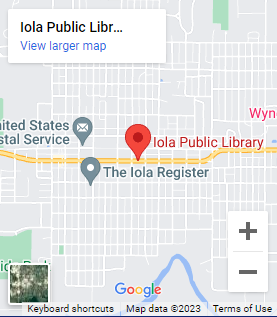Privacy Policy
Public Use Computers and Internet Access
1. The purpose of this policy is to define computer and Internet services provided by the library and to restrict access to those materials which are child pornography, obscene, or, for minors, which are harmful to minors.
In fulfillment of the library’s mission, the Iola Public Library is committed to meeting the information needs of the people we serve by providing the greatest possible information access within the means of the library and within the limitations of policy and law.
2. The library is concerned for the safety and security of users who access online information. The library has no control over the content of the Internet and cannot be held responsible for what the user sees when using the Internet. The restricting of a minor’s access to the Internet beyond that required by this policy is the responsibility of the parent or legal guardian.
3. A user may not use a library computer:
- To access or display information that is obscene or child pornography as defined by Kansas law
- if a minor, to access or display information that is harmful to minors
- to disclose, use, or disseminate personal information that could threaten or create a vulnerability for a minor, for any other person, or for the library
- to send threatening, obscene, abusive or harassing messages
- to attempt to gain unauthorized access to any data, computer, or network
- for any illegal purpose
4. The library shall use a DNS-based filter. Such filter shall be configured as nearly as possible to prevent access to materials that is obscene, child pornography, or harmful to minors while allowing access to other information.
It is recognized that filters do not block all inappropriate sites or allow access to all legitimate sites. The filter will be disabled upon request by an adult, or for a minor to enable access for bona fide research and other lawful purposes. Computers must not be used to display sexually explicit images, even when sites are not blocked by the filter or when the filter is disabled.
5. Patrons who encounter web sites which they believe should be blocked but which are not, or who are prevented from accessing web sites which they believe should not be blocked, may submit a complaint. This should be given in writing to the senior employee in charge and include the URL of the site in question and whether the request is to block or unblock it. Staff shall examine the site and determine whether it should be blocked or unblocked. If the filter currently being used is a regional service, the information and recommendation shall be forwarded to the appropriate regional staff.
Complaints about enforcement of this policy or observed patron behavior which violate this policy shall also be submitted in writing to the senior staff person in charge, providing as much detail as possible.
6. The library shall inform patrons of the provisions of this policy, including the standards used and procedures for complaint, by making the policy available on the library’s web site and in print at the circulation desk.
7. Some public computers may be reserved for specific functions, such as using specific software or using the library’s catalog. All other public computers will have Internet access.
8. Computers are available on a first come-first served basis. There is a 60 minute time limit on computer use. Computer management software will be used to enforce this time limit and requiring patrons to log in to use the computers. Additional time may be added if the public Internet computers are not all occupied, and those who have had a morning session may be given an additional one after noon. Patrons must be in good standing to have an active account for logging in. Visitors without library cards may be allowed to log in using a guest account. Users attempting to circumvent the computer management system may have their computer privileges revoked.
9. Patrons may not load software on the computers. Files may not be saved to the hard disk, but may be saved to the patron’s own storage devices. Although reasonable precautions will be taken, the library does not guarantee the hard disks to be virus free and assumes no liability for virus infections if persons save files to their own disks.
10. Copies may be printed at the rate of 10 cents per page. Payment should be made at the circulation desk.
11. Patrons may use their own laptops or other devices to use the library’s wi-fi network. The library does not provide technical assistance in configuring a patron’s device for wireless Internet. Laptops may be plugged in to a library electrical outlet where this does not create an obstacle for other users of the library, such as an electrical cord across a traffic path,.
Users of the library wi-fi must follow the same guidelines, where applicable, as for other Internet use. Therefore, wi-fi access is filtered, sexually explicit images may not be displayed, and the network may not be used to send threatening, obscene, abusive or harassing messages, or for any illegal purposes.
Public wi-fi is not secure. Information sent to and from a patron laptop computer may be captured by someone else with a wireless device and appropriate software. The library assumes no responsibility for the safety of patron equipment or data resulting from connection to the library’s wireless access.
12. Users who violate this policy may be denied use of the library’s computers.
13. Hotspot circulation
The library will make available hotspot devices with wireless service for circulation to any patron in good standing. The borrowing period is 2 weeks, with renewal allowed if there are no holds. Only one hotspot per household may be checked out. Service will be disconnected for hotspots which are 7 days overdue. Overdue fines are $1 per day for both adult and juvenile accounts.
Hotspots should be kept in a temperature-controlled environment (not left in vehicles, for example). They should not be put in the book drop.
Users who return hotspots late more than once or violate other portions of the library’s policy regarding hotspots may be denied use of the service in the future.
Revised 11-2-20
Iola Public Library
218 E. Madison
Iola, Kansas 66749
► Hours
Mon - Thur: 9:00 - 8:00
Fri & Sat: 9:00 - 5:00
Fax (620) 365-5137


